Androsace occidentalis Pursh
Western Rock Jasmine

Native
CC = 3
CW = 3
MOC = 53
© SRTurner
Androsace occidentalis PurshWestern Rock Jasmine | |
 |
Native CC = 3 CW = 3 MOC = 53 |
© SRTurner |
|
Family - Primulaceae Habit - Annual forb.
Stems - Absent. Leaves - All basal, sessile. Leaf blades 5-20 mm long, 2-4 mm wide, lanceolate to ovate, the margins inconspicuously toothed, the upper surface mintuely hairy, the undersurface glabrous.
Inflorescence - Inflorescence scapes 1 to more commonly several per plant, 3-12 cm long, erect or arched upward, finely pubescent with minute, branched hairs. Inflorescences simple umbels with 2-10 flowers, with an involucre of bracts, these 3-4 mm long, 1.5-2.0 mm wide, the flower stalks 10-30 mm long, unequal, ascending, finely hairy.
Flowers - Calyces 3-6 mm long, the tube 5-ridged, glabrous or nearly so, the lobes shorter than the tube, lanceolate, ascending, minutely hairy. Corollas shorter than to about as long as the calyces, 2-4 mm long, white, the 5 lobes loosely ascending to spreading, withering but tending to persist at fruiting. Stamens 5, the short filaments attached near the middle of the corolla tube, the tiny anthers oval. Ovary 1 mm in diameter, hemispherical, the style about 0.2 mm long, the stigma minute, capitate.
Fruits - Capsules, 1-2 mm long, globose, membranous toward the base, hardened toward the tip, dehiscing incompletely from the tip by 5 valves. Seeds 0.8-1.2 mm long, 0.8 mm wide, triangular in outline, the surface with a network of ridges and pits, dark brown. Flowering - March - June. Habitat - Glades, ledges, forest openings, crop fields, lawns, railroads, open disturbed areas. Origin - Native to the U.S. Lookalikes - None close. Other info. - This tiny species is often overlooked, although mature plants often take on a reddish color, and viewed up close the plants are quite distinctive and even attractive. It is found across most of Missouri, except for the Mississippi Lowlands area, and also across most of the central U.S. It adapts well to disturbed areas and can sometimes form large colonies along gravelly margins of trails and roads. Photographs taken at Washington State Park, Washington County, MO, 4-16-2018, the Marthasville Katy trailhead, Warren County, MO, 4-17-2018, and at Marais Temps Clair Conservation Area, St. Charles County, MO, 4-9-2019 (SRTurner). |